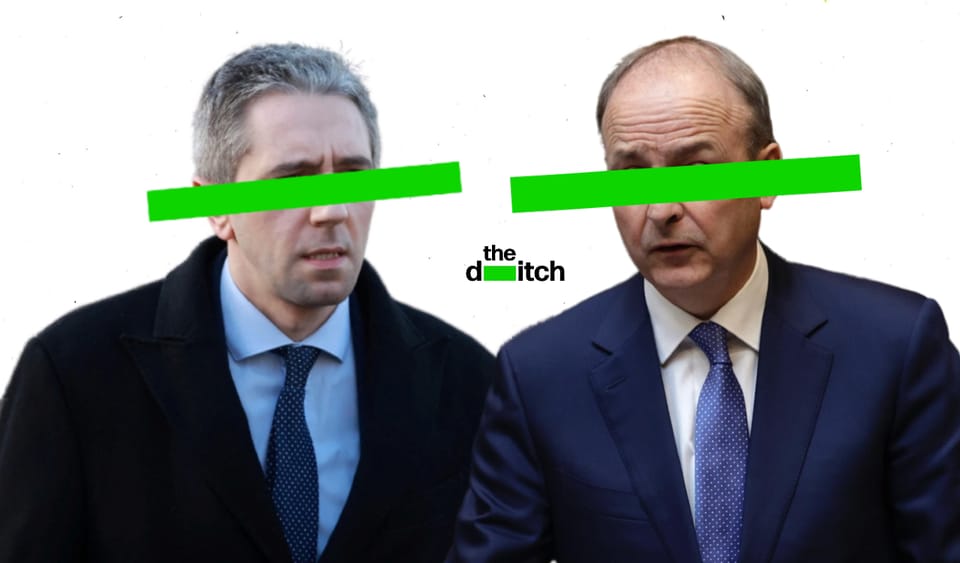The attorney general told government that replacing the Occupied Territories Bill rather than amending it would be a "political choice" and not a legally necessary one.
Today taoiseach Micheál Martin said though a new bill is being drafted, its progression is not considered a priority this Dáil term. In January Martin said that "virtually every section" of the Occupied Territories Bill would need to be amended – a claim contradicted by the legal advice he received from the attorney general last year.
In legal advice seen by The Ditch, attorney general Rossa Fanning said he sees "a stronger and more defensible legal basis" for the bill, though wrote that he ultimately agreed with his predecessors on the legislation's "legal difficulties". It was Fanning’s conclusion the bill could be amended rather than replaced.
Writing to Simon Harris, Micheál Martin and Roderic O’Gorman, he said government – given changes in “the geopolitical landscape in Gaza and Israel” – would be in a stronger position to use public policy grounds for prohibiting trade with illegal Israeli settlements in occupied Palestinian territories if challenged at a European level.
Fanning wrote, in advice government hasn’t published, there is a "strong argument" that a ban on trade with Occupied Palestinian Territories is "clearly in line with the guiding principles of the EU for its action on the international scene”. The EU, Fanning wrote, has stated it "does not recognise Israeli settlements in the OPT and that Israeli settlements in the OPT are illegal under international law."
The attorney general warned of potential issues with the bill as it’s “currently drafted”, with the emphasis his own. “There are significant legal difficulties relating to the bill as it is currently drafted and that its enactment would be at very substantial risk to the state,” he wrote.
Fanning doubted however whether the European Commission or any member state would have the “appetite” to take action against Ireland – and also advised how the state would defend such an action.
‘A political choice’
In his advice to government attorney general Rossa Fanning said the public policy case for the bill had been strengthened significantly.
The correspondence, sent last October, followed a request in August from then taoiseach Simon Harris for legal guidance on the Occupied Territories Bill after the International Court of Justice (ICJ) ruling that Israel's occupation of Palestinian territories is illegal.
While acknowledging what he considered issues with the bill, he said these could be addressed without requiring entirely new legislation.
"If the government were minded to accept this risk in light of the broader considerations at play and proceed to support the bill and seek to facilitate its enactment, the bill as currently drafted would certainly require revision," Fanning wrote.
Fanning said choosing to draft an entirely new bill – as government is now doing – rather than revising the current version would be a “political choice”.
“lt would be a political choice as to whether to propose committee stage amendments to the existing bill or instead to publish an entirely new bill, drafted by the Office of Parliamentary Counsel in accordance with its usual high standards,” he wrote.
"The ICJ opinion is not binding," Fanning wrote, but added that "such an opinion is generally considered to be an authoritative statement on international law given the status of the ICJ as the principal judicial organ of the United Nations."
The attorney general said "all the state parties to the Fourth Geneva Convention have the obligation, while respecting the Charter of the United Nations and international law, to ensure compliance by Israel with international humanitarian law as embodied in that convention."
While identifying possible constitutional flaws in the current bill, Fanning said these could be fixed through amendments. Among these is a provision giving the foreign affairs minister power to designate "occupied territories" without any defined criteria. Fanning warned this could breach two articles of the constitution.
Similarly Fanning identified a potential problem at EU level with the lack of criteria for what the state considers an occupied territory. “There is therefore a significant risk that the state will be found to be in breach of EU law if the bill is enacted,” he wrote.
Rather than its current breadth, which could apply globally, Fanning advised the bill should focus specifically on trade with illegal Israeli settlements in occupied Palestinian territories. He also said that issues related to the extraterritoriality – its application beyond Irish territory – of the bill would need to be addressed.
Fanning also discussed potential EU legal challenges in his advice.
While acknowledging that EU law exceptions for public policy measures are "very narrowly construed" and have "only very rarely succeeded," Fanning said Ireland’s position has been strengthened significantly.
"It is far from certain that the commission or another member state would have the appetite to take action against the state in light of the ongoing conflict and humanitarian crisis," Fanning wrote.
Fanning also advised how Ireland could defend the bill if challenged.
He said the state could argue that trade restrictions are "necessary to uphold respect for the rule of law, the universality and indivisibility of human rights and fundamental freedoms and respect for human dignity."
Fanning later wrote, "There would therefore seem to be a strong argument that any prohibition on trade with illegal settlers in the Occupied Palestinian Territories is clearly consistent with the guiding principles of the EU for its action on the international scene."
Fanning however agreed, he said, with advice from previous attorneys general about the risk to the state. “In the circumstances, I therefore ultimately agree with my predecessors and advise that there are significant legal difficulties with the bill that should prevent it from being enacted in its present form,” he wrote.
Last night Fine Gael TD Colm Brophy said on RTÉ Prime Time that government's action on the bill is based on the legal advice it received from the attorney general Rossa Fanning. "On foot of the advice that's there, we believe we must do what is right," Brophy said when questioned by Sarah McInerney if government was "taking people for fools".
Last year The Ditch reported that in February 2019 then finance minister Paschal Donohoe took part in a secret phone call with his Israeli counterpart to assure him government would use the money message mechanism to block the Occupied Territories Bill. The call was described as "confidential" in internal Israeli government correspondence and was not recorded in Donohoe's ministerial diary.
In October US ambassador Claire Cronin warned several government departments about "consequences" if the bill were enacted, claiming it would "cause economic uncertainty for almost 1,000 US companies operating in Ireland." Ninety minutes after Cronin's warning, Micheál Martin announced the bill would undergo a review rather than be enacted.
The Department of an Taoiseach and Department of Foreign Affairs have been contacted for comment.


